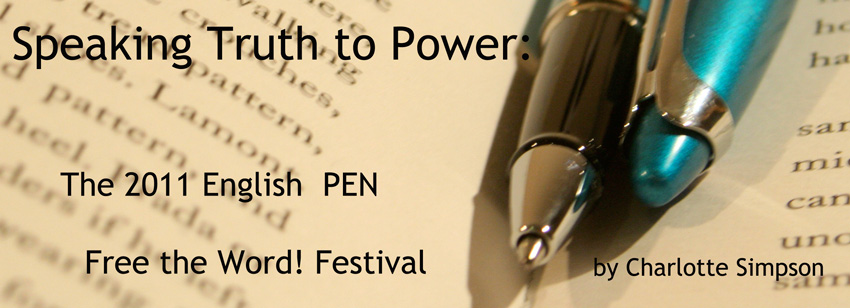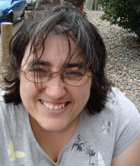

I was lucky enough to spend an April weekend in the company of some distinguished writers at English PEN's Free the Word! festival. English PEN, working within the international PEN community, promotes literature as a means of greater understanding between the world's people. The theme of this year's festival was 'speaking truth to power'. During a series of talks, writers from around the world contemplated whether a novel can have the power to change the world and whether fiction writers have an obligation to challenge power and expose corruption and abuses.
Crime writers Dominique Manotti and Margie Orford both feel that novels themselves don't bring about social or political change. Both women have been politically active—Manotti during the French workers' struggles of the 1960s and 70s, and Orford in 1980s South Africa, where she was imprisoned by the apartheid regime—and feel that activism is the key to changing society. Yet the fiction of both women draws deeply on their political beliefs and activities, and the very act of writing could surely be considered activism as they explore and expose their countries' morals. Orford's crime stories are her response to returning to South Africa in 2001 and finding it to be a country in which violence has become absorbed into the whole social fabric. She writes to understand why and how this has happened, and feels that fiction, unlike journalism, enables her to do this. Manotti uses her writing to show what lies underneath the discourse of the ruling classes, where she believes there is 'cover up, silence'. For her it is the only way she can do this; she stopped her political activity in the 1980s when she felt that François Mitterrand converted the political left to 'money'.
 We also heard from writers who have lived in places of continuing conflict. Do they consider
that fiction has the power to influence change? Easterine Kire Iralu feels a personal need to
write about the conflict in her homeland. Nagaland is a self-governing state in India with a
history of insurgency and independence movements since the 1940s, a problem that the Indian
media insist is an internal law and order problem. Iralu writes to close the ruptures that
this history of violence has caused. Before doing so, she first had to write her own response
to the experiences of her country in an epic poem that provided the personal catharsis she
needed before she could go on to write for other people. Now she uses her writing, and her
public position that has resulted, to inform Nagas and the rest of the world about the conflict
in her region. She says that she is addressing the silences that have occurred because of
the conflict, and because the Nagas have always been written about rather than writing about
themselves; they are a society with an oral tradition so their voices haven't been heard.
Iralu is currently collecting Naga folk stories, narratives that have been 'interrupted by
war and silenced'. She is also very active on Facebook and likes to interact with young
Nagas who she hopes may be inspired to write.
We also heard from writers who have lived in places of continuing conflict. Do they consider
that fiction has the power to influence change? Easterine Kire Iralu feels a personal need to
write about the conflict in her homeland. Nagaland is a self-governing state in India with a
history of insurgency and independence movements since the 1940s, a problem that the Indian
media insist is an internal law and order problem. Iralu writes to close the ruptures that
this history of violence has caused. Before doing so, she first had to write her own response
to the experiences of her country in an epic poem that provided the personal catharsis she
needed before she could go on to write for other people. Now she uses her writing, and her
public position that has resulted, to inform Nagas and the rest of the world about the conflict
in her region. She says that she is addressing the silences that have occurred because of
the conflict, and because the Nagas have always been written about rather than writing about
themselves; they are a society with an oral tradition so their voices haven't been heard.
Iralu is currently collecting Naga folk stories, narratives that have been 'interrupted by
war and silenced'. She is also very active on Facebook and likes to interact with young
Nagas who she hopes may be inspired to write.
Silenced voices are also of concern to Turkish writer Elif Shafak. During a discussion entitled 'Authorising History', she explained that she wants to provide multiple narratives, multiple interpretations of events, showing readers that there is no 'single truth'. She believes that if people are going to learn anything in life, they will learn it from those who are different from themselves. This reflects Shafak's own experiences. She writes in both Turkish and English and considers that she has multiple 'belongings', rather than feeling tied into the identity politics that pervade all aspects of life. Shafak's writing has also been influenced by her childhood. She saw her mother trying to find her way in a patriarchal society and feels that she has to give voice to women and minority groups in her stories. However, she denies that she takes on the women's view because of a sense of moral responsibility.
What became clear during the weekend I spent at the PEN festival was that many fiction
writers don't feel that they can change the status quo and don't have a sense of moral
obligation to write about the political and social problems facing their countries. However,
it was also obvious that all of the authors, whatever their genre or style, try to make
sense of the chaos and confusion around them through their stories. They are creating a
space in which accepted norms and behaviour are questioned. While they may not feel that
this makes a difference, I believe that the continuing practice of banning books indicates
that novel-writing still has the power to threaten a regime by making people think.
Note: Watch for a report in our next issue of the 2011 PEN World Voices Festival of International Literature held recently in New York City.

Charlotte Simpson lives in London. She reads a wide range of classic and contemporary fiction written by women and is currently focusing on Africa. She has a Masters degree in Modern British Women's History.